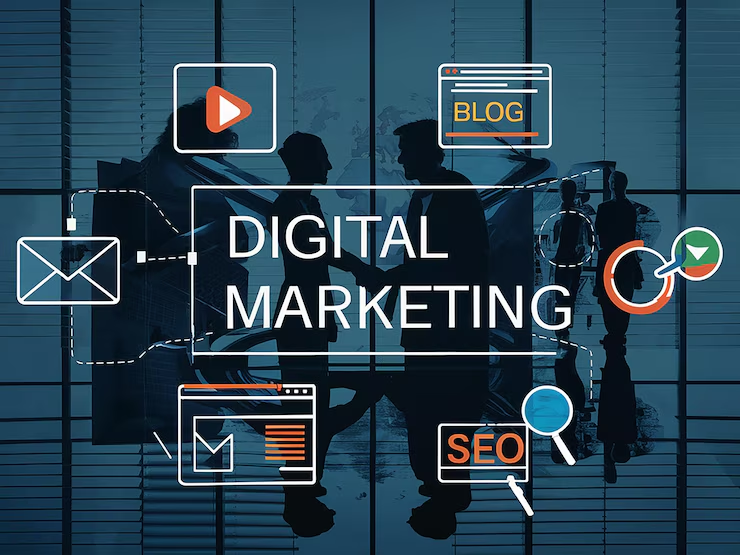Digital Marketing: A Comprehensive Guide to Mastering Key Strategies
Introduction
Digital marketing is a vast and ever-evolving field, crucial for any business aiming to succeed online. Understanding and implementing the right SEO and social media marketing strategies can significantly boost your online presence and drive business growth. This comprehensive guide covers 50 key topics to help you master digital marketing.
1. How to Start a Digital Marketing Agency
Starting a digital marketing agency requires a clear business plan, a strong online presence, and expertise in various digital marketing fields. Focus on building a skilled team and leveraging networking opportunities.
2. Best Digital Marketing Tools for Small Businesses
Small businesses can benefit from tools like Hootsuite for social media management, Google Analytics for website analysis, and Mailchimp for email marketing campaigns.
3. Benefits of Digital Marketing
Digital marketing offers cost-effective advertising, precise targeting, and measurable results. It helps businesses reach a global audience and engage with customers directly.
4. Digital Marketing Strategies for Startups
Startups should prioritize SEO, content marketing, and social media marketing. Focus on building a strong brand identity and utilizing cost-effective strategies like influencer marketing.
5. Digital Marketing Tips for Beginners
Beginners should learn the basics of SEO, content marketing, and social media marketing. Consistent learning and staying updated with industry trends are crucial.
6. SEO vs. SEM
SEO (Search Engine Optimization) focuses on organic search results, while SEM (Search Engine Marketing) includes paid search advertising. Both are essential for a comprehensive digital marketing strategy.
7. How to Do Keyword Research
Use tools like Google Keyword Planner, Ahrefs, or SEMrush to find relevant keywords with high search volume and low competition. Focus on long-tail keywords for better targeting.
8. Social Media Marketing Strategies
Create engaging content, interact with your audience, and use analytics to refine your strategies. Each social media platform requires a tailored approach.
9. How to Create a Content Marketing Plan
Define your goals, target audience, and content types. Plan your content calendar and use analytics to measure success and adjust your strategy.
10. Importance of Email Marketing
Email marketing helps build customer relationships, promote products, and drive traffic to your website. Personalization and segmentation are key to effective email marketing.
11. How to Use Google Analytics
Google Analytics provides insights into website traffic, user behaviour, and conversion rates. Use it to track performance and make data-driven decisions.
12. How to Improve Website SEO
Optimize your website’s content, meta tags, and loading speed. Build quality backlinks and ensure your site is mobile-friendly.
13. Digital Marketing Trends 2024
Stay updated with trends like AI in marketing, personalized content, voice search optimization, and video marketing to stay ahead of the competition.
14. How to Create a Social Media Calendar
A social media calendar helps you plan and schedule content in advance. Use tools like Hootsuite or Buffer to streamline the process.
15. Best Content Marketing Tools
Tools like BuzzSumo, CoSchedule, and Trello help in content research, planning, and collaboration. Use Grammarly for proofreading and Canva for designing visuals.
16. How to Optimize Your Blog for SEO
Use relevant keywords, create high-quality content, and optimize your meta tags. Ensure your blog is easy to navigate and mobile-friendly.
17. How to Use Pinterest for Business
Pinterest is a visual platform ideal for driving traffic and sales. Create engaging pins, use keywords in descriptions, and participate in group boards.
18. How to Measure ROI in Digital Marketing
Use analytics tools to track key metrics like conversion rates, customer acquisition costs, and return on ad spend. Regularly review and adjust your strategies.
19. How to Create a Successful PPC Campaign
Research keywords, create compelling ad copy, and optimize landing pages. Use A/B testing to refine your campaigns and monitor performance regularly.
20. How to Use LinkedIn for Lead Generation
Optimize your LinkedIn profile, share valuable content, and use LinkedIn’s advertising options to target specific industries and job roles.
21. Best Practices for Email Marketing
Segment your email list, personalize your messages, and use compelling subject lines. Ensure your emails are mobile-friendly and include clear calls to action.
22. How to Write Engaging Blog Posts
Focus on providing value to your readers, use storytelling techniques, and include visuals. Optimize your posts for SEO and promote them on social media.
23. How to Use Hashtags Effectively
Research trending hashtags and use a mix of popular and niche-specific tags. Avoid overloading your posts with too many hashtags.
24. How to Create a YouTube Marketing Strategy
Optimize your YouTube channel, create engaging video content, and use keywords in your video titles and descriptions. Promote your videos on other social media platforms.
25. How to Use Instagram Stories for Business
Instagram Stories are ideal for sharing behind-the-scenes content, promotions, and engaging with your audience. Use features like polls, questions, and swipe-up links.
26. How to Increase Website Traffic
Focus on SEO, create high-quality content, and promote your website through social media and email marketing. Guest blogging and influencer collaborations can also drive traffic.
27. How to Build an Email List
Offer valuable content like eBooks or exclusive discounts in exchange for email sign-ups. Use pop-ups and sign-up forms on your website.
28. How to Use Facebook Ads Effectively
Define your target audience, create compelling ad copy and visuals, and use A/B testing to optimize your ads. Monitor your ad performance and adjust as needed.
29. How to Use Twitter for Marketing
Engage with your audience, share valuable content, and use Twitter Ads to reach a broader audience. Participate in trending hashtags and Twitter chats.
30. How to Create a Buyer Persona
Identify your target audience’s demographics, interests, and pain points. Use this information to create detailed profiles that guide your marketing strategies.
31. How to Do Competitor Analysis
Analyze your competitors’ websites, content, and social media presence. Identify their strengths and weaknesses to inform your marketing strategy.
32. How to Use Snapchat for Business
Create engaging and interactive content, use Snapchat’s advertising options, and collaborate with influencers. Track your performance using Snapchat’s analytics.
33. How to Run a Successful Marketing Campaign
Set clear goals, identify your target audience, and choose the right marketing channels. Monitor your campaign’s performance and adjust your strategies as needed.
34. How to Use Influencer Marketing
Identify relevant influencers in your industry, build relationships, and collaborate on content. Ensure that influencer partnerships align with your brand values.
35. How to Improve Your Website’s User Experience
Focus on site speed, mobile-friendliness, and easy navigation. Use clear calls to action and ensure your content is easily accessible.
36. How to Do Local SEO
Optimize your Google My Business listing, use local keywords, and encourage customer reviews. Ensure your NAP (Name, Address, Phone number) information is consistent across all platforms.
37. How to Use Google My Business
Create and verify your Google My Business listing, add accurate business information, and encourage customer reviews. Regularly update your listing with new photos and posts.
38. How to Do Off-Page SEO
Build high-quality backlinks, engage in social media, and participate in industry forums and blogs. Off-page SEO helps improve your website’s authority and search rankings.
39. How to Create a Content Calendar
Plan your content topics, schedule publishing dates and track performance. Use tools like Trello or Asana to manage your content calendar.
40. How to Use TikTok for Marketing
Create engaging and creative videos, use trending hashtags, and collaborate with TikTok influencers. Track your performance using TikTok’s analytics.
41. How to Do Video Marketing
Create high-quality videos that provide value to your audience, optimize them for SEO, and promote them across your social media channels and website.
42. How to Do Mobile Marketing
Ensure your website and emails are mobile-friendly, create mobile-specific ads, and consider developing a mobile app to enhance customer engagement.
43. How to Create a Landing Page
Design a clean and focused layout, use compelling headlines and clear calls to action, and optimize for conversions. Test different elements to improve performance.
44. How to Use Affiliate Marketing
Partner with relevant affiliates, provide them with marketing materials and track their performance. Offer competitive commissions to incentivize your affiliates.
45. How to Do Content Curation
Share valuable content from other sources, add your insights, and provide credit. Content curation helps you provide value to your audience and establish thought leadership.
46. How to Use Marketing Automation
Automate repetitive tasks like email marketing, social media posting, and lead nurturing. Use tools like HubSpot, Marketo, or Mailchimp to streamline your processes.
47. How to Create a Webinar
Choose a relevant topic, promote your webinar through various channels, and engage your audience with interactive content. Follow up with attendees after the webinar.
48. How to Use Reddit for Marketing
Participate in relevant subreddits, provide value to the community, and avoid overt self-promotion. Use Reddit Ads to reach a broader audience.
49. How to Use Quora for Marketing
Answer questions related to your industry, provide valuable insights and include links to your content when relevant. Build your authority on the platform.
50. How to Use Podcasts for Marketing
Create informative and engaging podcast episodes, promote them on your website and social media, and invite industry experts as guests. Podcasts can help you reach a new audience and establish your authority.
FAQs
Q1: What is digital marketing? Digital marketing encompasses all marketing efforts that use the internet and electronic devices, including SEO, social media marketing, email marketing, and more.
Q2: Why is SEO important for my business? SEO helps improve your website’s visibility on search engines, driving organic traffic and increasing the chances of converting visitors into customers.
Q3: How can I measure the success of my digital marketing campaigns? Use analytics tools to track key metrics like website traffic, conversion rates, and return on investment (ROI). Regularly review your performance and adjust your strategies accordingly.
Q4: What are the benefits of social media marketing? Social media marketing helps you engage with your audience, build brand awareness, and drive traffic to your website. It also provides valuable insights into customer behaviour and preferences.
Q5: How often should I update my content marketing plan? Review and update your content marketing plan regularly to reflect changes in your business goals, industry trends, and audience preferences. Aim for at least a quarterly review.
Q6: What are some effective email marketing strategies? Segment your email list, personalize your messages, use compelling subject lines, and include clear calls to action. Regularly test and optimize your emails for better performance.
Q7: How can I use video marketing effectively? Create high-quality, engaging videos that provide value to your audience. Optimize your videos for SEO and promote them across your social media channels and website.
Q8: What is influencer marketing? Influencer marketing involves collaborating with influencers in your industry to promote your products or services. Influencers have a loyal following and can help increase your brand’s visibility and credibility.
Q9: How do I create a successful PPC campaign? Research keywords, create compelling ad copy, optimize your landing pages, and use A/B testing to refine your campaigns. Monitor your performance and adjust your strategies as needed.
Q10: What are some trends in digital marketing for 2024? Key trends include AI in marketing, personalized content, voice search optimization, and video marketing. Staying updated with these trends can help you stay ahead of the competition.
This guide covers the essential aspects of digital marketing, providing you with the knowledge and tools to succeed. Implement these strategies to boost your online presence, engage with your audience, and drive business growth.
Software Development as a Service: Transforming Business Solutions
Marketing Automation Platforms Lookinglion.net
Direct Deposit Payment Eligibility in 2024
How Long is an Ice Hockey Game?
Cracking The Coding Interview Filetype:pdf: The Ultimate Guide to Ace Your Technical Interviews









